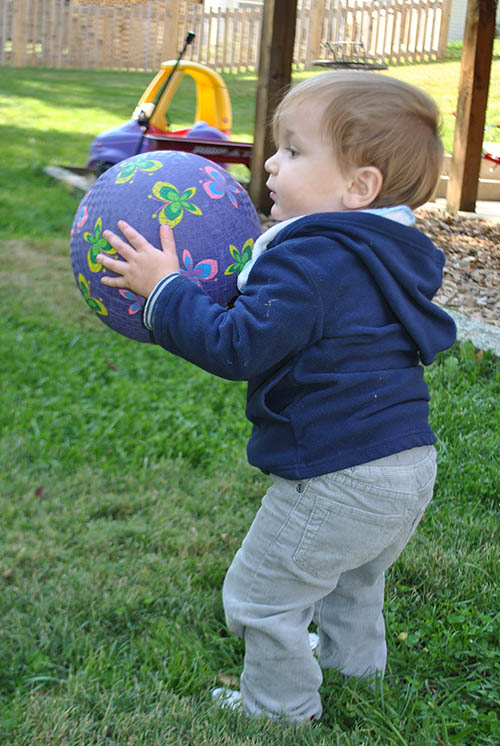There is strong evidence that young children experience significant health benefits from spending time outdoors. For example:
 Young children are more likely to engage in the kinds of vigorous, physical play that strengthens their hearts, lungs, and muscles because they tend to play harder and for longer periods outside.1 Regularly spending time outdoors increases opportunities for infants and toddlers to crawl, toddle, walk, climb, and run freely. In addition to improving large motor skills, vigorous physical activity improves children's overall fitness level.
Young children are more likely to engage in the kinds of vigorous, physical play that strengthens their hearts, lungs, and muscles because they tend to play harder and for longer periods outside.1 Regularly spending time outdoors increases opportunities for infants and toddlers to crawl, toddle, walk, climb, and run freely. In addition to improving large motor skills, vigorous physical activity improves children's overall fitness level.
- Spending time outdoors strengthens young children's immune systems. They experience fewer illness-related absences from child care when they have daily opportunities to play outside.2
- Spending time outdoors provides access to vitamin D.3 There is increasing concern that infants, toddlers, and older children are deficient in vitamin D. This vitamin is necessary for calcium absorption, which strengthens teeth and bones.
- Spending time outdoors positively affects young children's sleeping patterns. Natural sunlight helps regulate and balance sleep–wake cycles.4
- Children who play outdoors are less likely to be nearsighted. Direct exposure to the bright, natural light that comes from being outside may stimulate developing eyes in important ways, such as "maintaining the correct distance between the lens and the retina—which keeps vision in focus."5
- Children who are diagnosed with attention-deficit/hyperactive disorder (ADHD) and who play regularly in outdoor environments with lots of green (e.g., open, grassy fields; trees) have milder ADHD symptoms than those who play indoors or in pre-fabricated environments such as playgrounds with stationary equipment.6
- Time spent outdoors provides children with protection against life stressors and helps them develop a general sense of peace and well-being.7
- There is some evidence that playing in the dirt exposes children to a specific type of bacteria that may reduce anxiety and improve the ability to learn new tasks.8
1Thigpen, "Outdoor Play: Combating Sedentary Lifestyles," 19.
2Sennerstam, "Absence Due to Illness," 88.
3Albert Einstein College of Medicine, “Millions of U.S. Children Low in Vitamin D”; Huh and Gordon, “Vitamin D Deficiency in Children,” 161.
4Dewar, "Newborn Sleep Patters: A Survival Guide for the Science-Minded Parent"
5Aamodt and Chang, "Sun Is Best Optometrist."
6University of Illinois at Urbana–Champaign, "'Green time' Linked to Milder Symptoms."
7White, "Young Children's Relationship with Nature."
8American Society of Microbiology, "Can Bacteria Make You Smarter?"
Read more:
Resource Type: Article
National Centers: Early Childhood Development, Teaching and Learning
Last Updated: December 2, 2019
